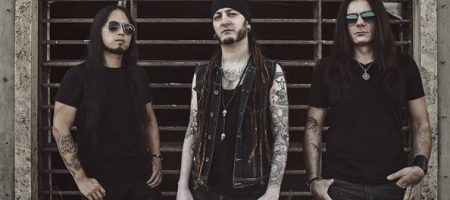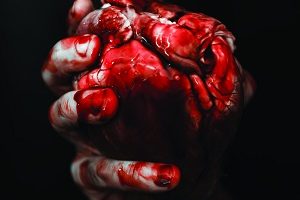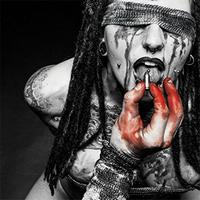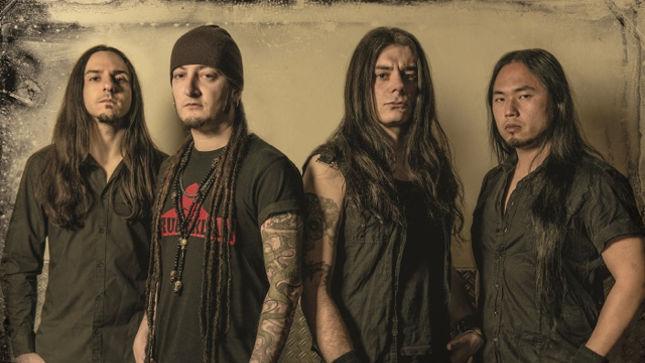Forgotten Tomb – Isolation Extreme
Tuesday, 28th April 2020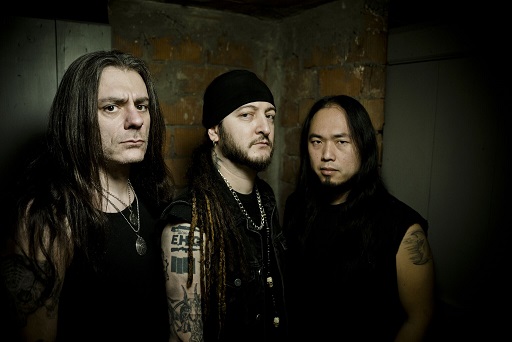
For over 20 years, the primary lyrical themes of Italy’s Forgotten Tomb have centered on depression, isolation, estrangement and nihilism. Coincidentally, these themes are dominating the world’s headlines as the Coronavirus continues to ravage the world at large. This is not a case of “We told you so” from Forgotten Tomb, but, rather, the realization that such topics will never go out of style as long as mankind continues to find ways to self-destruct.
The band’s career is laced with several certifiable gems and groundbreaking albums, particularly their early depressive black metal era that paved the way for it to become a sub-category. The doom/Goth leanings of their post-Negative Megalomania (2007) era and beyond has been just as satisfying, something that is carried over into their latest foray, Nihilistic Estrangement. It’s as natural and raw as Forgotten Tomb has sounded since the early 2000s. The band also found suit to dip back into the aforementioned black metal sounds, resulting in one of their most dynamic offerings to date. With that in mind, here’s bandleader/founding member/primary songwriter/vocalist/guitarist Herr Morbid to give us the scoop…
Dead Rhetoric: First off, how you are dealing with the current Coronavirus situation?
Herr Morbid: Well, currently I’ve been home for over a month and I’ve got another month like this ahead. I got sick at the beginning of March but I had mild symptoms so it wasn’t a big deal, except I pretty much lost completely my sense of smell and for the moment, it didn’t come back. My city was the second most affected city in Italy, so a huge amount of people died and restrictions on personal freedom have been harsh. Personally, my life didn’t change much since I didn’t use to hang out that often, to be honest, maybe a couple of days a week for a few drinks at the bar, but I normally spend a lot of time indoors anyway. Luckily, I have a backyard so now that the weather is nicer, I can chill out there or barbecue, stuff like that. The real pain in the ass is when you have to go out to buy groceries or ship packages, cause you’ve got to wait in line for a long time and shit like that. When I can, I order stuff online but even deliveries have been affected so you never know when you’ll get the stuff. By the way, I spend most of my time dealing with the promotion of the new album, recording some demos of new songs and projects, listening to a lot of music and watching a ton of movies.
Dead Rhetoric: Has this at all changed the way you view humanity?
Herr Morbid: I always preached my dislike for humankind both in lyrics and interviews so I’d be lying now if I said that I care. Of course, I care about my family, bandmates and close friends, but that’s always been my way of thinking even before this plague, so it’s nothing new. The way the world was going in the last 20 years was downhill and self-destructive anyway, so one way or the other I suppose humanity had to pay the price sooner or later.
Dead Rhetoric: Are you concerned about any long-term impacts this will have on Forgotten Tomb?
Herr Morbid: I’m more concerned about short-term impact, cause we’ve got the new album coming out and the live side of things now got halted, both the European and American tours that we had lined-up have been canceled/postponed as well as other live appearances, so it’s total shit, really. I was looking forward to a good season for shows, the best in years and the first time in the U.S., and now it’s all fucked, the year is probably lost and by the time things get back to normal the album will probably be out of the spotlight already. Also, being my only job, financially it’s really bad. So, it’s more of an immediate problem for us, things will eventually get back to normal but right now it sucks bad. It’s hard to predict how things will evolve at the moment so we’re waiting to see how things unfold in the next months. Having to travel the world and plan things in advance of months, it gets really difficult for a band to work in this situation, because there’s the risk you have to postpone things more than once and also organizers and venues now don’t know what their fate will be and it obviously makes it difficult to book shows. I hope next year things will get back to normal and we’ll manage to resume things where we left ‘em because life without traveling and playing shows is boring as fuck and unhealthy for a band.
Dead Rhetoric: Given that we’re all currently in quarantine, do you find it ironic that Nihilistic Estrangement’s lyrical topics deal with isolation and detachment?
Herr Morbid: Yeah, it’s kinda ironic especially because I completed the lyrics just before entering the studio at the end of December and shortly afterward the whole virus thing slowly started to make the news. The song though talks more about a mental detachment than a physical one. There’s also another song on the album titled, “RBMK,” which basically invokes some sort of disaster which wipes out humankind, so that was quite prophetic too, to say the least. The title refers to the Chernobyl reactor but it could have been anything really, even “COVID 19” or something else. I suppose it’s a bad case of “careful what you wish for!”
Dead Rhetoric: You mentioned Nihilistic Estrangement may become a trilogy. What do you have in mind? Or, is it too early to say?
Herr Morbid: All our albums are divided by trilogies. It started out casually, but now it became some sort of tradition. Every trilogy features some sort of similar sound between the albums, even if we like to always make each album different; but if you compare Songs to Leave, Springtime Depression and Love’s Burial Ground they all have things in common and they’re all considered depressive black metal classics, Negative Megalomania, Vol 5 and Under Saturn Retrograde marked a different era of the band, with the introduction of some clean vocals and more progressive structures and unusual elements, while …And Don’t Deliver Us From Evil, Hurt Yourself and the Ones You Love and We Owe You Nothing shared the increased heaviness of the sound and sludgier elements. Nihilistic Estrangement opens the fourth trilogy, so I guess the next two will follow in its footsteps, at least in the general approach, but with FT you can always expect some surprises especially since I’m the first who never knows where the next album will lead me. I let the inspiration guide me through songwriting and it depends a lot on what is going on in my life at that particular moment. I also like to find a niche that is relatively unexplored musically, so I usually try to shake things up a little and try to sound somewhat fresh and different from the other bands, I like to retain our trademark sound but at the same time to be hard to be pigeonholed. I am happy when somebody says that we don’t sound like any other band because we sound like FT. It’s really difficult these days to come up with something entirely innovative but there’s still space for mixing things up and making a sound of your own.
Dead Rhetoric: Will you start work on new music?
Herr Morbid: I already started, but I’m in a really early stage. This new album was written in a very short amount of time and recorded straight away; I like to work under pressure because I often come up with some urgency in the sound and some good ideas, but at the same time it’s really stressful and with this new album it was a little too much. So next time I want to be ready for the studio with quite some advance so I don’t have to go crazy to finish everything when the studio-time gets booked.
Dead Rhetoric: Paolo’s [Girardi] artwork is fantastic. How did you end up working with him?
Herr Morbid: The idea for the cover comes from a recurring dream that I had. The painting has to be seen from a point of view perspective, since in my dream I was walking on a trail surrounded by these gigantic waterfalls, with water slowly rising beneath my feet while at the horizon I could see this wild, hostile land devoid of any human civilization. So, I provided a draft to Paolo and I explained to him my dream and he came up with the painting, which is amazing. We wanted an artwork in the vein of the records of the early ’90s, those albums that you would buy just based on the incredible covers; the artworks of Dan Seagrave, Kristian Wahlin or Andreas Marschall. We have a great artist in Italy such as Paolo, which is also getting well-deserved international recognition these days, so there was no need to ask others. He gets the job done very fast and he’s an easy-going, no-nonsense guy, so we got along well.
Dead Rhetoric: You recorded the album in analog — it has a warmer feel because of it. What made you go this route?
Herr Morbid: We worked with some renowned producers over the last years but we wanted something different this time since all productions these days seem to sound the same, especially drum-wise. Everything is over-produced, all guitars sound like if they used digital plugins and such, and it’s incredibly boring. Those albums won’t stand the test of time, and I wanted something that had its own personality instead. So, you gotta look at what the greats of hard rock and heavy metal did in the past when every band had its peculiar sound and you can still listen to those classics because they sound timeless. I decided to produce the album myself and I chose microphones for all instruments, using the same ’60s/’70s vintage equipment used by AC/DC (and other bands of that era) on the three albums between ’78-’80, as well as playing on some vintage instruments and amps from the early ’80s. We also tracked everything on analog tapes. I wanted the performances of the musicians to stand out and the overall sound to be more faithful to our live-shows, every band should have its own sound on a record as opposed to the trend of today where pretty much all albums and bands seem to sound the same. We then mixed with our bass player Alex and did the mastering at Enormous Door in Texas because they also got analog equipment and Jack Control worked with bands who were striving for a similar approach such as Darkthrone or Poison Idea. The overall result sounds warmer and slightly unpolished than today’s records, but it’s got balls and character, it stands out compared to the generic productions which are popular lately. We’ll go this route in the future too, with some slight adjustments.
Dead Rhetoric: This, out of more recent Forgotten Tomb albums, has a bit of everything. You even reached back into your early depressive black metal roots. Was this a conscious decision?
Herr Morbid: I went through some sort of writer’s block between We Owe You Nothing and Nihilistic Estrangement but now that I got over it I feel very inspired, like if we started out fresh as a band with this latest album. I basically realized I was over-complicating my songwriting in the latest years so I stripped things down a bit and just focused on writing good songs like the old rock bands used to do. This mindset benefited me greatly and I basically made peace with my own creative process. It’s important for me to always be original while staying true to our trademark sound but I feel sometimes in the recent past I was even too concerned with being labeled in a certain way; this time I decided to shut the world outside, be it fans expectations or band members expectations, and I just let the songs flow out of my hands onto the guitar, without thinking too much about it. I wrote and demoed the bulk of the songs in two weeks or so and the guys of my band then listened to it and said it was the best stuff I wrote in years, then I knew I had been doing the right thing. We did three rehearsals and went straight into the recording studio. I wrote lyrics along the way. I think the album includes elements from all of our previous records and maybe it has a bit more of a black metal feeling than the last album we did, but at the same time it’s got some really weird stuff like southern, hard rock and blues influences, which have been part of our sound at least since Negative Megalomania but they’re more evident here, especially because of the stripped-down production. You’ve got slide guitars and blues licks, but you also got twin guitars solos or delay effects which hark back to the ’80s dark-wave, like on the title track. There’s also a fast, hypnotic black metal song which sounds very old-school. It’s a varied album, considering it’s got just six songs, but at the same time, I think it sounds very cohesive. I like to call it “black rock” cause it ain’t one-hundred percent black metal but it ain’t black’n’roll either. It’s “black rock” or “blues black,” I don’t know if it makes sense but it’s certainly different from what’s going on these days in metal. It basically has nothing to do with 2000s metal or rock music.
Dead Rhetoric: You have been reluctant to revisit the aforementioned depressive black metal sound. What made this right album to do so?
Herr Morbid: I don’t think it really has much to do with depressive black metal, the way I incorporated that kind of sound in the album is the same I did on all of our albums after the first trilogy. We never really forgot that part of our sound, it’s what’s around it that went through different phases over the years. You can have a burger in a lot of different flavors, with different toppings, bread and side dishes, but in the end, it’s always a burger if you know what I mean. Maybe this time the overall feeling is more black metal, but when writing the album, I thought it would be interesting to play black metal like if we were a blues/hard rock-based band, which is pretty much what we are. We are a hard rock band who plays extreme metal, we have a different approach than most of the other bands in the genre. The rock stuff was already there on the first album, but people took a while to realize until it started to be more upfront in the music or when they saw us play live. So, what I mean is that it’s still an FT album, but maybe this time might remind you more of the old records because of the way we put the elements together or because it’s a bit more stripped-down and atmospheric.
Dead Rhetoric: On perhaps a more positive note, you reached 20 years as a band last year. Did you do any reflecting and/or celebrating?
Herr Morbid: We didn’t really celebrate. We organized a few special shows performing our first album, Songs to Leave, in its entirety as a present to the fans, since it’s many people’s favorite and it’s widely considered as one of the albums that laid the foundations for a whole subgenre. It’s probably my least favorite of all our albums, but I enjoyed playing it live cause songs turned out a lot more powerful than on the record and it felt right to celebrate the importance of that album for a whole scene as well as the start of our legacy. We played a couple of festivals in Italy and Spain and we should do the last one in Germany in December. People seemed to enjoy it a lot, we also got visuals going on a screen behind the band, so it’s a pretty cool show. It’s been 20 difficult years, but I’m glad we made it to this point, even if my expectations were quite different. Some great moments along the way but also a lot of disappointments or missed opportunities. Some mistakes on our side too, but I often feel we’re a very underrated band especially since a large number of other bands literally stole or emulated our original sound and image over the years. That’s the unfortunate fate of most prime movers. We’ll see what happens in the next 20 years, but unless I die first, I plan to have at least 20 albums in our catalog by the time we quit, so we got ten to go by now.
Dead Rhetoric: Finally, what’s the rest of the year looking like for Forgotten Tomb?
Herr Morbid: It’s looking like shit, considering all our upcoming tours and live shows are gone. I suppose we’ll try to promote our new album on the usual channels and see what happens next. Right now, we can’t even rehearse or meet up cause we all live in different cities, so we have to wait until the lockdown’s over. If we’re allowed to play live by this autumn, we’re going to headline one of the days at Cosmic Void festival in London, U.K. and then we should tour Europe in October, plus the Songs to Leave special set in Germany in December. Things for live entertainment are not looking good for 2020, so I’m not sure any of this will happen, but we’ll try until it’s possible.











